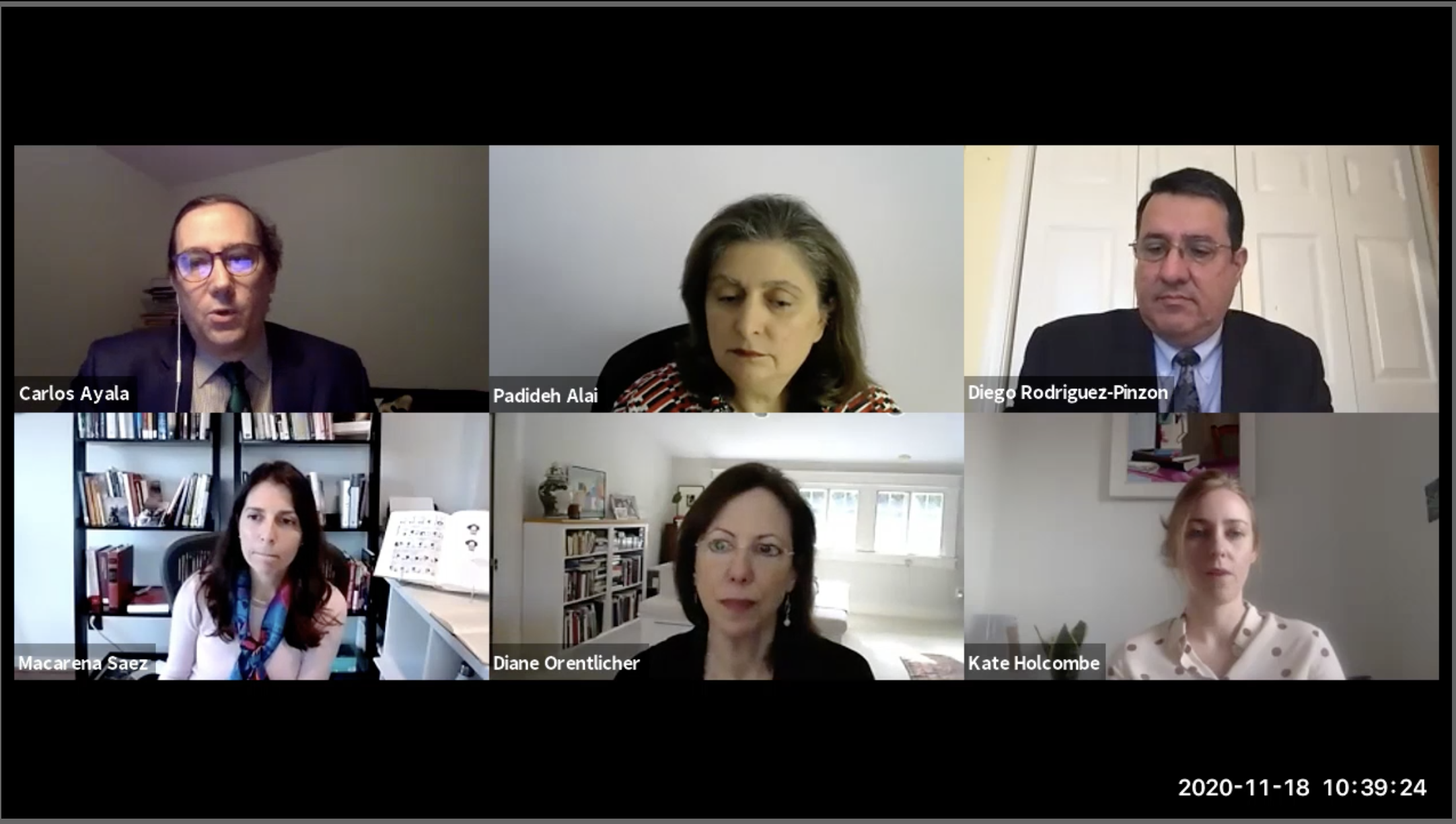
Pandemics and International Law: The Need for International Action
On November 18, 2020, AUWCL hosted an event on Pandemics and International Law: The Need for International Action. The conference was organized by the AUWCL International Law Student Association, in coordination with the Academy on Human Rights and Humanitarian Law. The event was co-sponsored by the Centre for International Law, National University of Singapore; the Vietnamese National University, Hanoi, School of Law; the Autonomous University of Lisbon; and the Florida International University College of Law. The objective of the event was to provide a forum for various members of the United Nations International Law Commission and AUWCL faculty experts to reflect on the role international law could play in adopting measures or norms to prevent and react effectively to pandemics.
The conference consisted of two panels. The first panel was moderated by AUWCL Professor Claudia Martin and featured a welcome by Dean Emeritus and Professor of Law Claudio Grossman and the President of the AUWCL Chapter of the International Law Student Association Jaclyn Lahr. The panelists were members of the United Nations International Law Commission: AUWCL Professor Claudio Grossman; Nguy?n Hõng Thao, Senior Lecturer at the Diplomacy Academy of Vietnam and National University of Hanoi; Nilüfer Oral, Director of the Centre of International Law (CIL) at the National University of Singapore; Charles C. Jalloh, Professor of Law, Florida International University; and Patrícia Galvão Teles, Associate Professor of International Law at the Autonomous University of Lisbon and Co-Director of the Singapore Academy of International Law (the CIL eAcademy 2020).
The discussions on this panel highlighted the existence of a broad range of international legal rules applicable in situations of pandemics. They constitute a complex “patchwork” of norms. Any work in this area would require showcasing the interconnectedness of these diverse rules. A common denominator for many rules are international human rights, which inspire many rules applicable in the areas of health, national security, and economic development. The panelists also highlighted that COVID-19 has, to some extend, surprised the implementation of the Sustainable Development Goals (2016-2030). Further consensus should be sought to enhance cooperation between States in the fight against COVID-19 and to be better prepared for any future, similar occurrence.
The second panel was moderated by Carlos Ayala, Vice-President of the International Commission of Jurists and Adjunct Professor and Visiting Scholar at WCL, and featured several AUWCL professors: Padideh Ala’i, Professor of Law and Director of International and Comparative Legal Studies; Kate Holcombe, Assistant Director of Impact Litigation and the Kovler Project Against Torture; Diane Orentlicher: Professor of International Law; Diego Rodriguez-Pinzón, Professorial Lecturer in Residence and Co-Director of the Academy on Human Rights and Humanitarian Law; and Macarena Saéz, Fellow in International Legal Studies and Faculty Director of the Center for Human Rights and Humanitarian Law. Acting Dean Robert Dinerstein and Professor Claudio Grossman provided concluding remarks.
This panel discussed the fulfillment under international law of specific rights, such as the right to life, to personal integrity, and health. The panelists highlighted the relevance of the international human rights mechanisms in the enforcement of these rights, as they have the powers to inquire and inspect the situation on the ground. The Optional Protocol to the United Nations Convention against Torture was mentioned, which allows the Committee members to inspect detention centers even without prior notice. These are efficient tools in the fulfillment of some of the most basic rights of all people, including the most vulnerable. International law may also play an important role in the fulfillment of the rights of women and girls, as it mandates positive action from States to prevent and punish discrimination, domestic violence and other acts against these vulnerable groups and which have become a serious problem during the pandemic. The panelists also addressed the role of international organizations, such as the World Health Organization and the World Trade Organization, in providing efficient solutions to the challenges. This followed up with the comments already made in the first panel, where the members of the International Law Commission highlighted the need for stronger international cooperation between States.
One possible field of cooperation that could be strengthened is the compliance with the 1994 Agreement on Trade in Pharmaceutical Products (also known as the Pharmaceutical Agreement or the Pharma Agreement). So far, only 34 States are parties, but it has already been a basis for the reduction of substantial barriers to trade, eliminating ca. 7,000 pharmaceutical products in the trade between States parties. Besides the reduction of tariffs for the products needed to fight pandemics, the WTO also contributes very importantly to international cooperation by providing a forum for reporting and exchanging information on import restrictions and other trade barriers.
Please click here for the complete recording of the event.